TRADE GLOBALLY with Clarity
WORKPLACE LAW simplified
IT TRENDS shaping business
RBIDZ: Powering SA’s industrial future



TRADE GLOBALLY with Clarity
WORKPLACE LAW simplified
IT TRENDS shaping business
RBIDZ: Powering SA’s industrial future


Coca-Cola Beverages South Africa (CCBSA) is pleased to announce the appointment of three dynamic leaders who will help shape the company's future with their expertise and commitment to excellence. These strategic leadership changes reflect CCBSA's vision to refresh our consumers everyday while positively impacting the lives of our customers, employees and communities.

Appointed as People and Culture Director
Tony brings a wealth of experience, with over 20 years in Human Resources, including 15 years at senior leadership and executive levels. He has a long-standing association with CCBSA. Over his 14 years with the company, he has gained a deep understanding of its business, culture, and people.


His extensive career spans unionised and corporate environments across industries such as Food and Beverages, Mining, Development Finance and Consumer Goods. He has held significant roles at leading organisations, including De Beers, Lonmin, the Industrial Development Corporation (IDC), Amalgamated Beverage Industries, and Unilever. His expertise positions him to lead the People and Culture function with a focus on fostering a workplace that aligns with CCBSA's strategic objectives.



Appointed as Public Affairs,
Effective 1 January 2025, Basetsana-Bame Modimogale has been appointed as Public Affairs, Communications, and Sustainability Director for CCBA South Africa. Modimogale's appointment reflects CCBSA's commitment to empowering its people and fostering leadership growth from within.



To enhance the alignment of IT capabilities with business needs, Edwin Fisher has been appointed IT Director for CCBSA, effective 1 January 2025. With 24 years of IT experience, including 12 years in senior leadership roles, Fisher has been with CCBA for 17 years, showcasing his deep understanding of the company’s IT landscape.
Under his leadership, CCBSA aims to drive its digitisation agenda, fostering agile, responsive, and integrated IT services that support employees and strategic objectives.
Since joining the business in 2007 as a Trainee Account Manager, Modimogale has excelled in a series of leadership roles, including Sales Manager, Key Accounts Manager, Customer Manager TEG, General Manager Alternative Revenue Streams, and her most recent position as Country Lead꞉ Customer Excellence National Accounts. In each role, she has demonstrated exceptional leadership, strong customer relationship management skills, and the ability to drive results through strategic partnerships.
Modimogale holds a BCom in Law, a BCom Honours in Strategic Management, and a Master of Business Administration (MBA). Her contributions to the business have been recognised through numerous internal and external awards, underscoring her impact and achievements.
CCBSA’s leadership team is committed to driving the company’s strategic growth ambition through a strong customer centric strategy. The team is also tasked with responding to the rapidly changing trading environment that requires sound and expeditious decision making.
The team will also mobilise employees and develop talent to ensure they reach their full potential while embedding values such as integrity, accountability, and collaboration. With over 7,000 employees across 13 manufacturing facilities, CCBSA continues to execute its vision with passion for business, brands, customers, and the communities we serve.
“As we welcome Tony, Bame and Edwin to their new roles, we are confident in their ability to lead with purpose and deliver results that drive sustainable growth for our organisation and stakeholders,” concluded Rajbally.
Subscribe to SA Business Integrator and join our community where we feature thought leadership and insights pertaining to the business landscape. Save 20% on the next 4 editions and have it delivered to your door.















While Freedom Month is all about celebrating how far we’ve come, it is also a moment to think about the future and the huge role education plays in shaping it. In a country where education was once a privilege for a select few, it is now one of the most powerful tools for freedom and opportunity.
In this issue, we feature Professor Thoko Mayekiso, Vice-Chancellor of the University of Mpumalanga. A distinguished clinical psychologist and academic leader, Professor Mayekiso has been pivotal in the university’s growth, shaping the institution’s vision and impact. As she prepares to step down, she reflects on her leadership journey, the importance of research, and the challenges and opportunities that lie ahead for higher education in South Africa.
We also had the privilege of covering the inauguration of Professor Francis Petersen as Vice-Chancellor of the University of Pretoria, another influential leader committed to shaping the future of higher education in South Africa. His vision for the future of the university and his focus on leadership and innovation mark an exciting new chapter for one of the country’s leading academic institutions.
On the business front, we explore how Coca-Cola Beverages South Africa (CCBSA) is driving growth and creating value in communities across the country. Their commitment to appointing strong leadership and making a positive social impact highlights the link between effective business strategies and community development.
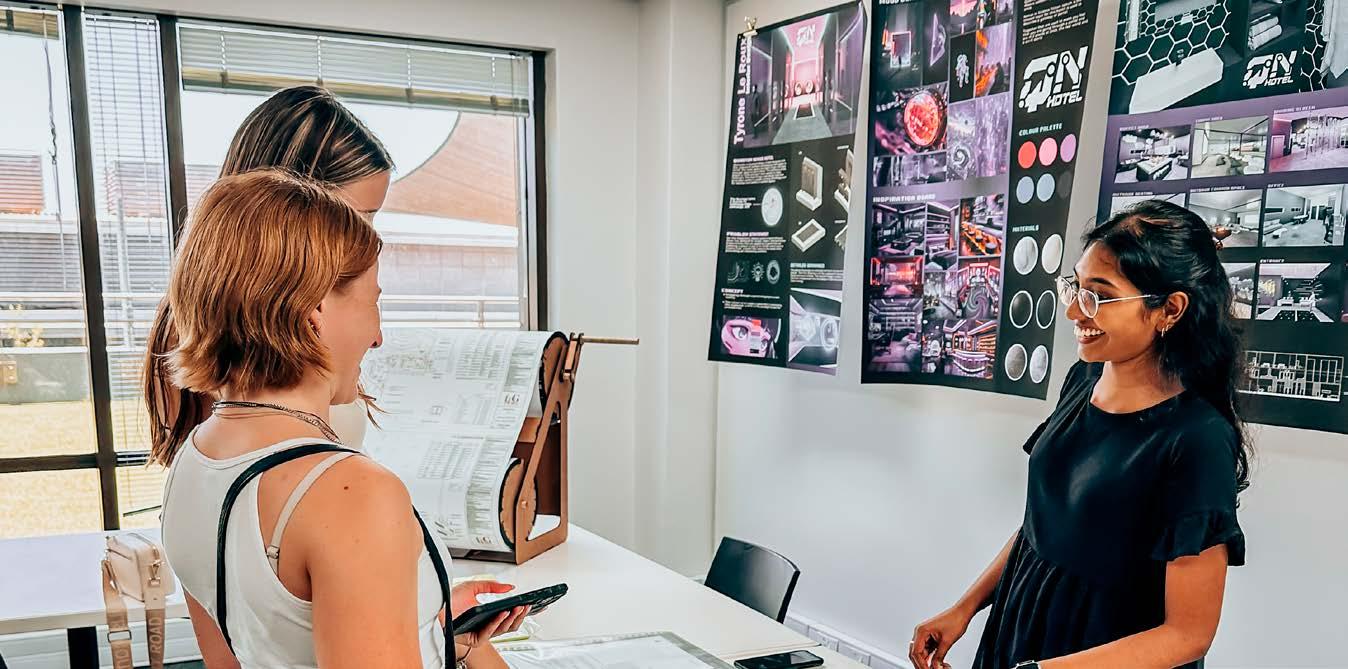








production and performance to operate safely in all weather conditions.
production and performance to operate safely in all weather conditions.
production and performance to operate safely in all weather conditions.




This is achieved with improved running costs such as fuel efficiency and reduction in repairs and maintenance frequency. Water savings and related running costs with increased production cycle times remain among the biggest benefits of employing a Dust-A-Side solution.
This is achieved with improved running costs such as fuel efficiency and reduction in repairs and maintenance frequency. Water savings and related running costs with increased production cycle times remain among the biggest benefits of employing a Dust-A-Side solution.
A safer working environment
A safer working environment
Effective dust suppression
Effective dust suppression
>90% water savings
>90% water savings
Reduced rolling resistance
Reduced rolling resistance
Decreased diesel consumption
Increased tyre life
Increased tyre life
Improved hauling cycle time
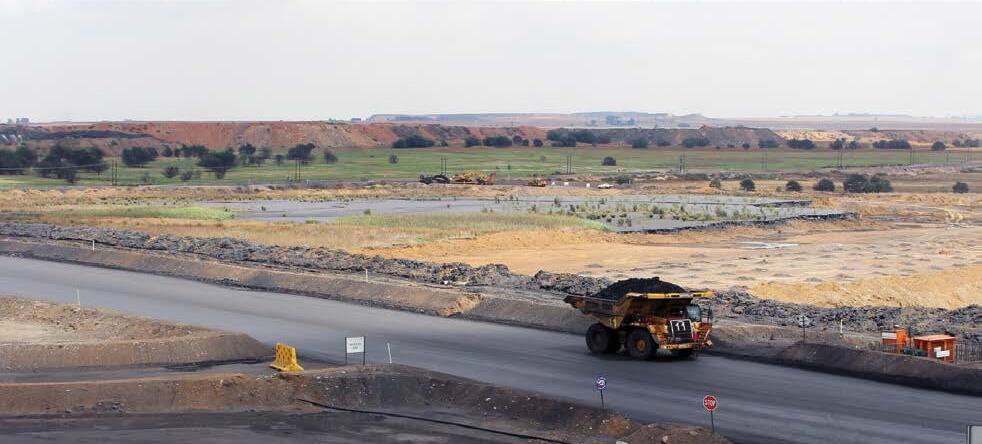
This is achieved with improved running costs such as fuel efficiency and reduction in repairs and maintenance frequency. Water savings and related running costs with increased production cycle times remain among the biggest benefits of employing a Dust-A-Side solution.

production and performance weather conditions.


Haul Roads
A safer working environment
Decreased diesel consumption

Effective dust suppression
>90% water savings
Reduced rolling resistance
Decreased diesel consumption
Improved hauling cycle time
Reduction of HME repairs and maintenance budget
Increased tyre life
Improved hauling cycle time
Reduction of HME repairs and maintenance budget
No recapping required
No recapping required
Reduced production downtime after rain
Reduced production downtime after rain
No investment in road maintenance equipment
No recapping required
No investment in road maintenance equipment
Increased productivity
This is achieved with improved fuel efficiency and reduction maintenance frequency. Water running costs with increased remain among the biggest benefits Dust-A-Side solution.
Dust-A-Side
+27 (0) 12 648 8900 | info@dustaside.com UNDERGROUND MINING
WHY CHOOSE
A safer working environment
Reduced production downtime after rain
Increased productivity
Proven return on investment (ROI)
Proven return on investment (ROI)
Dust-A-Side
Menlyn Piazza 2nd Floor, Cnr Glen Manor and Lois Avenue, Menlyn, Pretoria, 0063, South Africa
Menlyn Piazza 2nd Floor,

Effective dust suppression
>90% water savings
Reduced rolling
Reduction of HME repairs and maintenance budget
Cnr Glen Manor and Lois Avenue, Menlyn, Pretoria, 0063, South Africa
Dust Suppression Systems PLANT & PROCESSING
Decreased diesel consumption
Increased tyre
Improved hauling
Reduction of HME repairs and No recapping
No investment in road maintenance equipment
Increased productivity
CONTACT US



Proven return on investment (ROI)
+27 (0) 12 648 8900 | info@dustaside.com

Reduced production downtime
No investment in road maintenance
Fog Cannon Technology
Stockpile Sealing
Dust-A-Side
Menlyn Piazza 2nd Floor, Cnr Glen Manor and Lois Avenue, Menlyn, Pretoria, 0063, South Africa
Dust Suppression Systems
+27 (0) 12 648 8900 | info@dustaside.com
Increased productivity
Proven return on investment
CONTACT
Dust-A-Side
Menlyn Piazza 2nd

Cnr Glen Manor and Menlyn, Pretoria, 0063, South
+27 (0) 12 648 8900 | info@dustaside.com






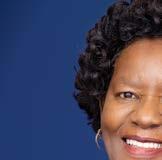







123rf.com


DISTRIBUTION



PUBLISHER
Elroy van Heerden-Mays elroy@mediaxpose.co.za
EDITOR
Tarryn-Leigh Solomons editor@sabusinessintegrator.co.za
SUB-EDITOR
Sameena Amien sub@mediaxpose.co.za
CONTENT MANAGER
Wadoeda Adams artwork@mediaxpose.co.za
DESIGNERS
Anja Bramley | Shaun van Heerden-Mays | Tia Arendse
EDITORIAL CONTRIBUTORS
Adrian Moors
Ezekiel Dikio
Warren Bonheim
Wale Arewa
Katlego Maphai


Media Support | On the Dot IMAGE
PUBLISHED BY

6 Carlton Crescent, Parklands, 7441
Tel: 021 424 3625 Fax: 086 544 5217
E-mail: info@sabusinessintegrator.co.za Website: www.mediaxpose.co.za
Disclaimer: The views expressed in this publication are not necessarily those of the publisher or its agents. While every effort has been made to ensure the accuracy of the information published, the publisher does not accept responsibility for any error or omission contained herein. Consequently, no person connected with the publication of this journal will be liable for any loss or damage sustained by any reader as a result of action following statements or opinions expressed herein. The publisher will give consideration to all material submitted, but does not take responsibility for damage or its safe return.
ADVERTISING SALES MANAGER
Rashieda Wyngaardt rashieda@sabusinessintegrator.co.za
ADVERTISING SALES
Luthando Maqungo luthando@sabusinessintegrator.co.za
Reginald Motsoahae reginald@sabusinessintegrator.co.za
Luyanda Mbopa luyanda@sabusinessintegrator.co.za
MEDIA PARTNERSHIPS | EDITORIAL ASSISTANT
Maurisha Niewenhuys maurisha@mediaxpose.co.za
DIGITAL MARKETING MANAGER
Juhi Rampersad juhi@mediaxpose.co.za
DIGITAL AND SOCIAL MEDIA
Kyla van Heerden social@mediaxpose.co.za
DISTRIBUTION & SUBSCRIPTIONS
Shihaam Gyer distribution@mediaxpose.co.za
CHIEF FINANCIAL OFFICER
Shaun van Heerden-Mays shaun@mediaxpose.co.za
RECEPTIONIST
Kayley Townsend receptionist@mediaxpose.co.za


Are you in search of e cient, reliable, and cost-effective fleet management services? Look no further.
g-FleeT Management specialises in providing top-notch vehicle leasing and fleet management services to government departments, state-owned enterprises, and public entities. With a dedicated commitment to keeping government service delivery on the move, we offer two main product offerings:
Our comprehensive Full Maintenance Lease (FML) solution incorporates vehicle acquisition, maintenance, replacement, and disposal. The FML service offers you:
• Flexible Vehicle Acquisition: Tailored to your specific needs.
• Diverse Vehicle Selection: Choose from a wide range of vehicle models available on the RT57 Contract.
• Long-Term Lease Options: Ranging from 12 to 36 months or 100,000 km to suit your requirements.
• Fuel Cards: Ensuring smooth fuel management.
• Vehicle Licensing and Registration: We handle the paperwork and renewals.

• Tra c Fines Management: Keeping your fleet compliant.
• Comprehensive Vehicle Tracking: Real-time tracking for effective management of your fleet.
• Full Maintenance and Repairs Service: Minimising downtime and costs.
• Accident and Loss Management: Handling unexpected situations with care.
• 24/7 Roadside Assistance: Ensuring your fleet stays on the road.
• Fleet Information System: An online asset management system for streamlined operations.
• Vehicle Disposal: Effortlessly transition your fleet when necessary.
• VIP Self Drive: Luxury car hire service, including medium to large luxury sedans and SUVs.
• VIP Chauffeur Drive: Professional chauffeur service for government o cials in luxurious vehicles.
• Pool Rental: Ideal for short-term projects, offering a wide range of economy and commercial vehicle models, including minibuses, buses, and trucks, available for daily, monthly, or extended rental periods.


• Cost-Effective FML Solution: Enjoy cost savings while we manage your fleet.
• Flexible Vehicle Acquisition: Tailor your fleet to your needs.
• Reduced Ownership Risk: Vehicle ownership concerns remain with g-FleeT.
• Branding and Accessory Options: Choose preferential branding and additional accessories.
For all your government fleet solutions, contact us at:
Tel: 011 372 8600/8646
Call Centre: 011 372 8602
Web: www.gfleet.gov.za
24-Hour Roadside Assistance: 0800 111 352
Customer Management Service
Thulani Nkala
Tel: 083 387 4084
Email: Thulani.Nkala@gauteng.gov.za
Marketing and Communication
Lindah Mudau
Tel: 083 379 9540
Email: Lindah.Mudau@gauteng,gov.za
Choose g-FleeT for unparalleled fleet solutions. A trading entity of the Gauteng Department of Roads and Transport.


Professor Thoko Mayekiso, ViceChancellor (VC) of the University of Mpumalanga (UMP) and a clinical psychologist, has been instrumental in the university’s growth. A C3-rated scientist, she holds an MA from the University of Fort Hare and a DPhil in Psychology from the Free University Berlin. As she prepares to step down, she reflects on her leadership, research, and the future of higher education.
PROFESSOR THOKO MAYEKISO | VICE-CHANCELLOR OF THE UNIVERSITY OF MPUMALANGA



Professor Mayekiso, as you reflect on your tenure as VC at UMP, what do you consider your most significant achievements?
The most significant achievements stem largely from being the pioneering VC. This speaks to believing in the vision (the "why" of our existence), setting the tone, and ensuring that the vision cascades throughout the organisation in a manner that is both credible and inspiring. Furthermore, driving the mission (the "how") and the strategic goals and objectives addresses the question of what needs to be done, while holding both myself and the staff accountable to ensure that the goals and objectives are properly set and implemented with relentless drive. As the Founding VC, I had to ensure that the values we agreed upon were upheld and practised; that they were not just words that held no meaning.
The vision, mission, strategic objectives, and values formed the guardrails, enabling us to build a sense of community. With a proper organisational template, we were able to see growth and development in all areas: the number of students, the staff complement, the programmes offered, the necessary infrastructure, and a building programme designed to ensure that, in just 10 years, UMP became an iconic campus, punching above its weight and securing its rightful place among universities in South Africa and on the African continent.
What key practical contributions have you made to the growth and development of UMP during your leadership?
The first thing I targeted was creating a credible brand. This brand would result from the recruitment of highly qualified staff, but also with staff courageous enough to be pioneers - individuals with a spirit of taking calculated risks and embracing creativity and innovation. By harnessing all that is new and forming collaborations with established universities both in the country and around the world, we were able to benchmark using the best examples. We created a conducive environment informed by enabling policies. The value of excellence was embedded in all we did, ensuring it became the DNA of UMP. The focus on the holistic development of students was key, ensuring we prioritised their cognitive, personal, social, physical, and aesthetic development.
As you prepare to step down, what legacy do you hope to leave behind at UMP?
There are students who started with us at first-year level who are now finishing their Master’s and Doctoral programmes. We put them under the aegis of the ATSP (Academic Talent Stewardship Programme). These students remain a legacy of my endeavours. They are the own timber who will serve their alma mater long after I have stepped down. Furthermore, the VC’s scholarship programme has seen to the financial support of the academically deserving, yet financially needy students. Today, these VC scholars form the palpable backbone of the legacy I will be leaving behind. In addition, supporting the transformation agenda and creating equality and equity opportunities for female students adds to this legacy.
More than the foregoing, the visible presence of myself and Chief Justice Mandisa Maya became a powerful testament for the leadership of women. Our female students saw this, and this will inspire them to greater heights. The iconic infrastructure developed at UMP during my tenure forms a great part of my legacy.
What are your aspirations for UMP’s future, and where do you envision the university in the next five to 10 years?
My aspirations for UMP’s future are that it grows in leaps and bounds. This growth should be driven by continuous self-renewal and improvement. UMP must meet the needs of the region, do much more, and invest in innovation and entrepreneurship. Where there is serious investment in research and development (R&D), progress is assured.
Climate change and its challenges are upon us. The imperative of the Just Energy Transition (JET) is also pressing, as are the Sustainable Development Goals. A university worth its salt should be at the forefront of addressing these seemingly intractable human challenges. The talent is there, and the right levels of empathy abound. If future staff and students of UMP can keep this in mind, a bright future lies ahead.
Grinding poverty continues to ravage communities, and if artificial intelligence can be harnessed to make the world a better place, UMP will have played its part. The shifting geopolitical landscape also demands that UMP has the necessary agility and adaptability.
Given your extensive experience in academia, what is your vision for the future of higher education in South Africa, particularly in the post-pandemic era?
This year marks five full years since the pandemic wreaked havoc on humanity. What this pandemic did was remind us not to take things for granted or become complacent. We need to build our resilience muscles and never stop being creative and innovative.
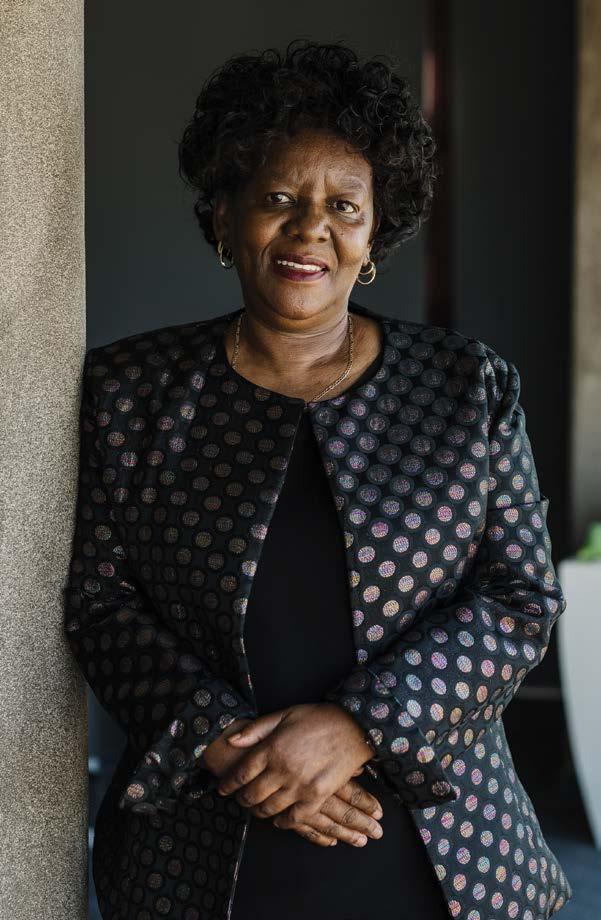
In developing countries, esoteric research – not driven by the material conditions of the people on the ground –is a luxury, and should be discouraged.”
Moreover, we should never be wasteful – always applying our minds fully before allocating any resources and ensuring mechanisms of accountability are in place. We should remain curious and continually ask ourselves, "What could possibly go wrong?" With such a mindset, we can never be reckless. Always be prudent, and forever be guided by well-conceived plans.
I envision a higher education sector that must adapt to the responsible use of artificial intelligence and emerging technologies.
In your view, how can universities play a more impactful role in advancing national development, particularly in areas such as community upliftment and public health?
Universities have an important role to play in community development, and hence community engagement is considered one of the core missions of higher education institutions. A deep understanding of the people we serve is essential. Engaging in meaningful conversations with these individuals is crucial to fully understanding their needs.
People with disabilities have a slogan: “Nothing about us, without us.” Planning with communities, rather than for them, is key. Prevention is better than cure: investing in education and raising awareness is a valuable strategy. Making technology accessible at the grassroots level has proven helpful. For example, using mobile phones to remind the elderly to collect their chronic medication is a step in the right direction when it comes to community involvement and the upliftment of public health.
As a C3-rated scientist with a distinguished research career, how has your work influenced academic discourse, particularly in psychology and community development?’
Opening the eyes of our communities to trauma has been key. Equally important has been demonstrating
that hopelessness and despair are not inevitable. We can change our situation – our destiny will be largely shaped by believing that positive change is possible.
My work has promoted mindful living and resilience. Networking and empowering those around us have been my calling. The quest to break the back of patriarchy has found expression in my academic endeavours, and I look back with satisfaction at how the situation for female academics is improving, thanks to the issues raised and questions posed in my scholarship and research. Crucially, some of the strategies for improvement suggested in those have also had an impact.
Building trust and being trustworthy are also key in a leadership role. Respect for oneself and others plays a pivotal role in leadership.”
Your research interests include adolescent adjustment problems, HIV/AIDS, and community development. How have these areas shaped your perspective on the role of universities in addressing societal challenges?
These areas have significantly strengthened my resolve to conduct research that addresses real-life challenges. In developing countries, esoteric research that is not driven by the material conditions of the people on the ground is a luxury – one that should be discouraged. Universities should focus on understanding and responding to the pressing issues faced by communities, as these are the true points of concern.
Research must be relevant, practical, and geared towards improving the lives of those who need it the most. The role of universities extends beyond academic pursuit; they should be actively involved in finding solutions that help bridge the gap between the ivory tower and the communities that surround them. Closing this gap between town and gown is crucial for building meaningful partnerships and creating tangible, lasting change. It is only by focusing on the needs of local communities that we can ensure that academic research serves a greater purpose, one that directly contributes to the development and wellbeing of the people. In doing so, universities can play a pivotal role in shaping a future where research is not just theoretical but has a profound, positive impact on society.
As a leading female academic and university executive, what advice would you offer to women aspiring to leadership roles in South Africa?
Leadership is both a huge responsibility and a privilege. It should, therefore, be fully leveraged for the betterment of humanity. The burden can be emotionally heavy, especially during times of crisis. Leaders should always work on their mental health and wellbeing so that they can maintain perspective and never become enmeshed in the challenges at hand.
Building trust and being trustworthy are also key in a leadership role. Respect for oneself and others plays a pivotal role in leadership. Most importantly, embracing one’s imperfections and working to improve them is essential. The insight that humans have flaws, without being judgemental, helps in how one works with others.
Reflecting on your career, which experiences or individuals have had the most influence on your leadership style?
My parents, both educators, influenced my leadership style. Some of my mentors and teachers in psychology also played a role. Training in clinical psychology emphasised the importance of emotional intelligence (EQ) to me, and to this day, it continues to influence my leadership approac. The extensive international exposure I had – studying for my PhD in Berlin, working as a clinical psychologist in Leicester, in the UK as a Commonwealth Fellow, and attending international visits and conferences – have all contributed to shaping my leadership style.
As you transition to your next chapter, what is the message you'd like to share with the students, staff, and broader UMP community?
Keep the values of UMP at the forefront: Excellence, Integrity, Diversity, Collaboration, Adaptability, Relevance, and Inspiration. Not only should you keep them in mind, but also apply them in your daily lives –then both you and UMP as an institution will thrive!

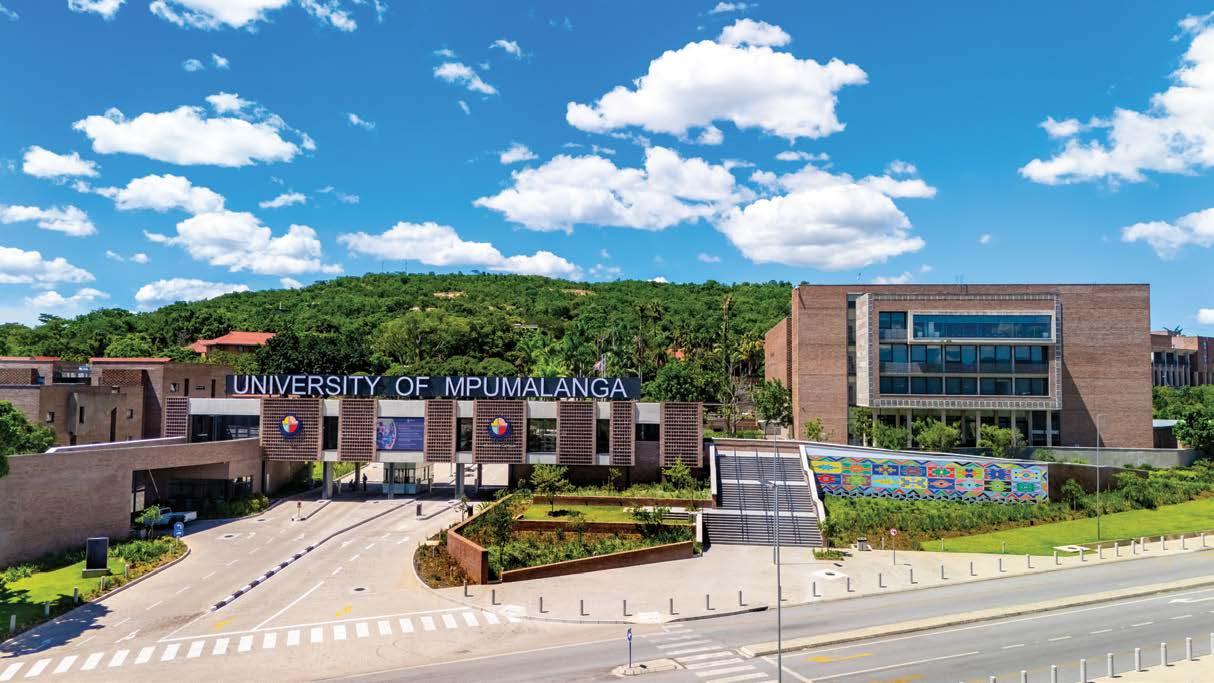
Prepare yourself for the future and be ready for Opportunities by studying through the
University of Mpumalanga
One-year Programme
Higher Certificate in Information Communication
Technology in User Support
Higher Certificate in Event Management
Three-year Programmes
Diploma in Culinary Arts
Diploma in Agriculture
Diploma in Nature Conservation
Diploma in Animal Production
Diploma in Hospitality Management
Diploma in Information Communication
Technology in Applications Development
Bachelor of Development Studies
Bachelor of Agriculture in Agricultural Extension and Rural Resource Management
Bachelor of Science (General)
Bachelor of Science in Environmental Sciences
Bachelor of Commerce (General)
Bachelor of Administration
Bachelor of Arts (General)
Bachelor of Arts in Geography
Bachelor of Arts in Media, Communication & Culture
Bachelor of Information Communication
Technology
Four-year Programmes
Bachelor of Education in Foundation Phase Teaching
Bachelor of Science in Agriculture
Bachelor of Science in Forestry
Bachelor of Laws
Bachelor of Social Work
One-year Programmes
Advanced Diploma in Agriculture in Agricultural Extension
Advanced Diploma in Nature Conservation
Advanced Diploma in Agriculture in Post-Harvest Technology
Advanced Diploma in Agricultural Production Management
Advanced Diploma in Hospitality Management
Advanced Diploma in Information Technology in Applications Development
Advanced Diploma in Animal Production
Postgraduate Diploma in Nature Conservation
Postgraduate Diploma in Information Communication Technology
Postgraduate Diploma in Hospitality Management
Postgraduate Diploma in Agriculture
Bachelor of Arts Honours (General)
Bachelor of Arts Honours in Political Science
Bachelor of Arts Honours in Culture and Heritage Studies
Bachelor of Arts Honours in Geography
Bachelor of Arts Honours in English
Bachelor of Arts Honours in Sociology
Bachelor of Arts Honours in Psychology
Bachelor of Arts Honours in Industrial Psychology
Bachelor of Arts Honours in siSwati
Bachelor of Arts Honours in Archaeology
Bachelor of Arts Honours in Tourism
Bachelor of Arts Honours in Gender Studies
Bachelor of Arts Honours in isiNdebele
Bachelor of Commerce Honours in Industrial and Organisational Psychology
Bachelor of Commerce Honours in Economics
Bachelor of Commerce Honours in Business Management
Bachelor of Commerce Honours in Organisational
Psychology
Bachelor of Science Honours (General)
Bachelor of Science Honours in Geology
Bachelor of Science Honours in Entomology
Bachelor of Science Honours in Geography
Bachelor of Science Honours in Geography
Bachelor of Science Honours in Ecology
Bachelor of Science Honours in Ecology
Bachelor of Honours in Information
Bachelor of Honours in Information
Communication Technology
Communication Technology
Bachelor of Honours in Development Studies
Bachelor of Honours in Development Studies
Bachelor of Honours in Agricultural Extension and Rural Resource Management
Bachelor of Honours in Agricultural Extension
Rural Resource Management
Bachelor of Administration Honours
Bachelor of Administration Honours
Bachelor of Education Honours in Teaching and Learning
Bachelor of Education Honours in Teaching and Learning
One-year full-time and two years part-time Programmes
One-year full-time and two years part-time Programmes
Master of Development Studies
Master of Development Studies
Master of Education in Early Childhood Education
Master of Education in Early Childhood Education
Master of Agriculture in Agricultural Extension
Master of Agriculture in Agricultural Extension
Master of Science
Master of Science
Master of Science in Agriculture
Master of Science in Agriculture
Master of Commerce
Master of Commerce
Master of Commerce in Business Management
Master of Commerce in Business Management
Master of Arts in English Language and Literature
Master of Arts in English Language and Literature
Master of Arts in siSwati Language and Literature
Master of Arts in siSwati Language and Literature
Master of Arts in Industrial Psychology
Master of Arts
Master of Arts in Industrial Psychology
Master of Arts
Master of Arts in Geography
Master of Arts in Geography
Master of Arts in Psychology
Master of Arts in Psychology
Master in Computing
Master in Computing
Master in Administration
Master in Administration
Master of Tourism and Hospitality Management
Doctoral Degrees
Master of Tourism and Hospitality Management
Doctor of Philosophy in Agriculture
Doctor of Philosophy in Agriculture
Doctor of Philosophy in Development Studies
Doctor of Philosophy in Development Studies
Doctor of Philosophy in Humanities
Doctor of Philosophy in Humanities
Doctor of Philosophy (Commerce)
Doctor of Philosophy (Commerce)
Doctor of Philosophy (Science)
Doctor of Philosophy (Science)
Doctor of Philosophy in Economics
Doctor of Philosophy in Economics
Doctor of Philosophy in Education
Doctor of Philosophy in Education
Mamonare Mphahlele is an accomplished executive with over a decade’s experience in engineering, smelting, and project management within the mining industry. Starting her career at BHP Billiton in 2013, she quickly advanced by optimising operations, managing large projects, and improving safety. Now a key leader at SmartOps, she is driving change and promoting inclusivity. In this interview, she shares her journey, leadership philosophy, and efforts to empower young Black women in engineering and project management.

What inspired you to pursue a career in engineering and project management within the mining sector?
My journey into engineering and project management was fuelled by a fascination with the technical and problem-solving aspects of engineering. I’ve always been intrigued by how things work, and wanted to solve challenges around me. Mining offers a blend of practical and technical problem-solving. The idea of contributing to large-scale projects that impact the economy and society resonated with me. Project management allowed me to apply my technical expertise while coordinating teams and executing complex projects, which kept me motivated.
Were there any key mentors or figures who played a significant role in guiding your early career?
Although I didn’t have a formalised mentorship relation in the earlier years of my career, a technical coach was key to my development. As you grow in your career and climb the ladder, the mentorship relationships you have
also need to evolve. In different roles, you have different focus areas, and there is a different vision guiding you.
Moving into leadership required a greater focus on leadership as well as soft skills. Though I had leadership training early on, I realised the need for mentorship from an executive who had navigated similar challenges. This guidance has been invaluable, reassuring me that my experiences aren’t unique and providing insight into handling executive-level challenges effectively.
As a financial controller for the PMO, you successfully closed the financial year with a clean audit. What are the key elements of effective financial control in project management? Effective financial control relies on robust systems and governance structures. Integrating these systems with project delivery enables real-time cost tracking, project value assessment, and risk identification.
With the right reporting structures and system-generated reports, risks can be identified and addressed proactively,
ensuring timely action plans. These systems also help monitor financial performance, highlighting discrepancies, shortfalls, or misalignments between actual work and cost projections.
Continuous reviews allow teams to track expenditure, analyse band rates, and manage budgets effectively. Success in cost control depends not only on strong stakeholder relationships but also on leveraging the right systems for accurate financial tracking and risk management.
Given your experience in engineering governance, what are some critical governance gaps you’ve encountered in mining, and how can they be addressed?
One of the critical governance gaps in mining is the misalignment between project execution and financial oversight. While governance structures exist, they are often not enforced or integrated well enough to connect people, processes, and systems. Without a strong focus on governance frameworks, inconsistencies can lead to poor decision-making and passive action management.
What do you believe sets apart a highperforming project management office (PMO) in the mining industry?
A high-performing PMO in mining effectively integrates cost, quality, time, and other project elements within a well-defined and enforced governance framework. Strong governance ensures transparent reporting, while robust financial systems enable real-time cost tracking and risk identification.
Secondly, as the mining sector continually evolves, a PMO must adapt its strategies to align with market shifts, regulatory changes, and project complexities. Rather than operating in silos, PMOs collaborate with stakeholders across operations to maintain high performance.
Finally, leadership within the PMO is crucial. A strong leadership team that fosters accountability, communication, and data-driven decision-making will drive high performance.
As a Black woman in the mining sector, what have been some of the biggest hurdles you’ve faced in leadership, and how did you navigate them? One of the biggest challenges has been navigating
leadership spaces with limited representation. Few women – especially Black women – hold executive roles, making it essential to work harder to establish credibility and be heard. I have had to be intentional about demonstrating my capabilities, allowing my work to speak for itself, and continuously developing my skills to remain competitive.
Another challenge has been overcoming gender and racial biases – leadership is not defined by masculinity. Women are breaking free from limiting beliefs and imposter syndrome, recognising that leading with empathy drives positive change within organisations. This is our strength.
How do you see the role of women evolving in the mining industry, and what needs to change for more women to enter executive roles?
The mining industry has made progress in gender inclusivity, with more women entering the sector and taking on leadership roles. Their impact is clear in how they apply their skills to drive success.
To create lasting change, companies must implement structured mentorship programmes and align career development with gender equity strategies. Shifting outdated norms and strengthening governance will also help women thrive. Organisations must prioritise diversity and inclusion not just in policy, but in practice, to ensure equal access to leadership opportunities.
Based on your journey, what advice would you give to young women aspiring to build careers in engineering, project management, or mining?
Seek out mentors aligned with your career vision, build a strong technical foundation, and embrace leadership opportunities. Success in mining isn’t limited to one path – whether you choose to lead, manage, or specialise, each role adds value to the industry. The key is to remain adaptable, trust in your abilities, actively carve out your space and continuously raise the bar on how you show up. Resilience, honing your technical skills and adaptability are crucial!


AMSOL’s commitment to empowerment is evident in the AMSOL Employee Trust, which owns 12% of the business and benefits more than 300 permanent employees. Since 2016, AMSOL has distributed R75.5 million to beneficiaries, reflecting its ongoing commitment to shared value.
At AMSOL, true sustainability goes beyond operations –to empowering people. Through its investment in skills development, education, and environmental awareness, the company is shaping the future of the maritime industry while also supporting organisations making an impact. This aligns with AMSOL’s role as a trusted maritime partner, ensuring that operations contribute to a resilient, inclusive, and environmentally sustainable future.
“We understand that building a foundation for long-term sustainability and growth means investing not only in our people, but also in the communities we serve. In this way, we create lasting social impact for generations to come,” says AMSOL Chief Executive Officer, Dan Ngakane.
Socio-Economic Development partnerships are a priority in AMSOL’s broader sustainability strategy.
Recent initiatives highlight the tangible impact.
• Preparing youth for the workplace: With AMSOL’s support, The Mfesane Youth Café Programme in Vredenburg has provided participants with training, job-preparedness workshops, and mentorship opportunities, ensuring that they are better prepared to enter the workforce.
• Strengthening maritime education: In Durban, the Maritime Educators Programme, hosted by the EThekwini Maritime Cluster (EMC) in collaboration with AMSOL and the Department of Education, provides Maritime Economics and Nautical Science teachers with industry insights, helping them enhance lesson plans and equip learners with a deeper understanding of maritime careers and operations.
• Promoting marine environmental awareness: AMSOL’s partnership with the Southern African Foundation for the Conservation of Coastal Birds (SANCCOB) in Gqeberha and Cape Town remains a key initiative in promoting marine conservation and
education. In 2024, AMSOL supported interactive programmes in both locations, introducing critical topics such as seabird conservation, biodiversity, and climate change to learners.
• Promoting economic access for all: In continuation of AMSOL’s multi-year partnership with Cape Mental Health, in 2024, AMSOL funded an entrepreneurship training and workplace experience programme for 20 unemployed black female South Africans living with disabilities.
By investing in people and the environment, AMSOL is helping to shape a stronger, more inclusive maritime industry.
550 91%
EMPLOYEES
BLACK SOUTH AFRICANS
38% YOUTH UNDER 35
28% OF PROCUREMENT SPEND WITH EMERGING MICRO ENTERPRISES (EME) IN 2024
R13 MILLION SPENT ON TRAINING & DEVELOPMENT OF EMPLOYEES
AMSOL is a South African-owned market leader operating 21 specialist vessels across the region and delivering marine solutions to clients in the energy, maritime, mining, and ports sectors. A Level 2 Contributor to Broad-Based Black Economic Empowerment, 33% of the company is owned by its employees and management.



































































































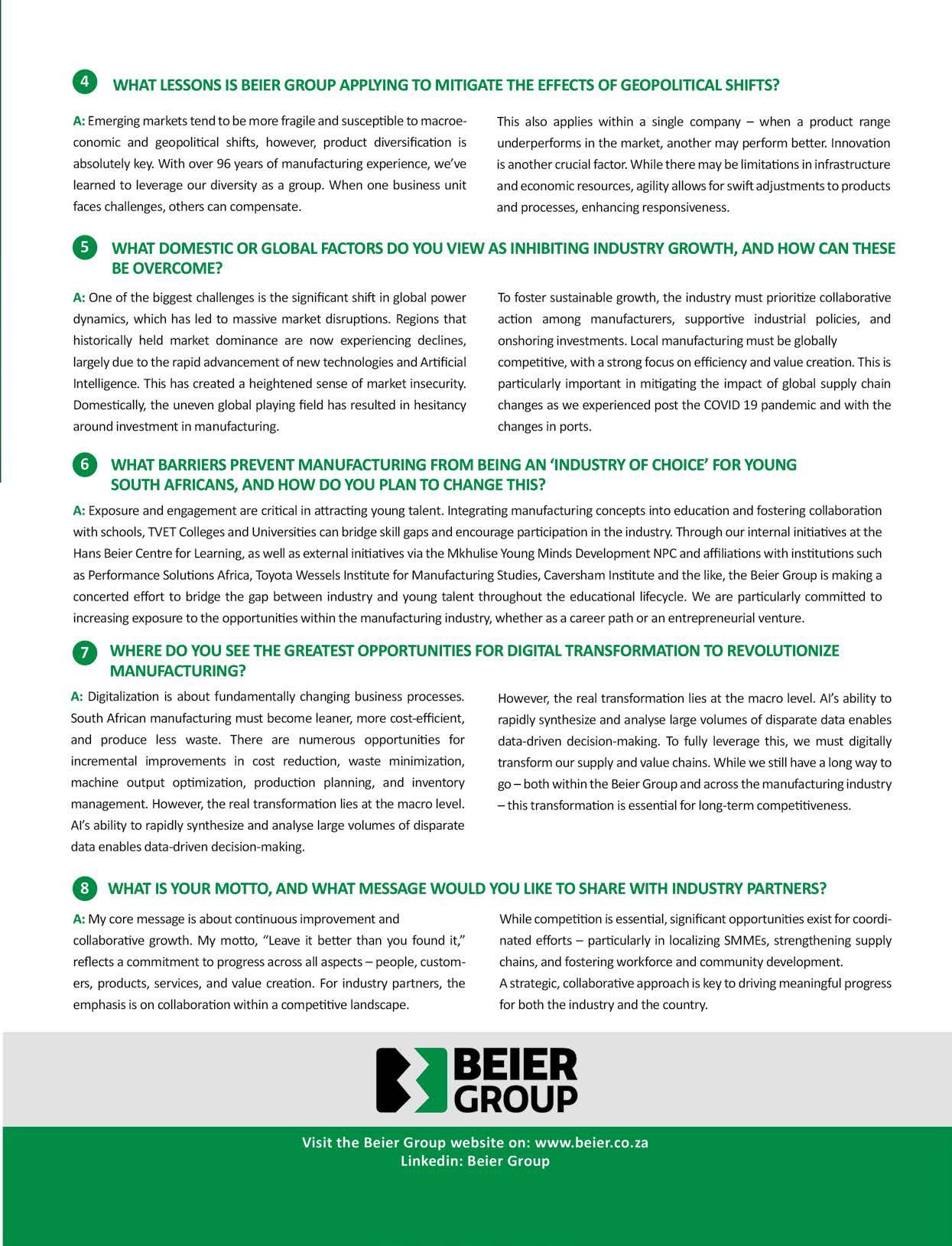
As KwaZulu-Natal stands at the threshold of economic opportunity, Sihle Ngcamu, CEO of Trade & Investment KwaZulu-Natal, is driving a new vision to make the province a premier investment destination.

KwaZulu-Natal (KZN) stands at the threshold of tremendous economic opportunity, says Sihle Ngcamu, CEO of Trade & Investment KwaZulu-Natal (TIKZN). With a government of national unity now in place, both the National and Provincial administrations have committed to key priorities: economic growth and job creation, reducing poverty while addressing the high cost of living, and building a capable, ethical, and developmental state. “These are not just political promises; they are imperatives for a brighter future for KZN, which is uniquely positioned to capitalise on these priorities. I am honoured to lead the provincial entity responsible for attracting investment and facilitating trade, which serve as catalysts for the advancement of the economy and the improvement of the lives of the people of KZN.”
Ngcamu has been serving the people of KZN for more than three decades. Prior to his appointment as CEO in September 2024, he was Executive Manager for Investment Promotion at TIKZN. He has worked in public service at provincial and local levels, as well as in government entities such as Richards Bay Industrial Development Zone, in the private sector with BHP Billiton, as well as academia. With two master's degrees in Law and Environmental Management, Ngcamu is well-positioned to lead the roadmap to growth and prosperity.
This is an especially exciting time for TIKZN, having welcomed a new Board of Directors appointed by the MEC
for Economic Development, Tourism and Environmental Affairs, Rev Musa Zondi, in March 2025. Among the first tasks of these esteemed men and women will be to provide governance oversight of the Organisational Strategy 2025-2030. With their vision of being the premier partner in growing an inclusive provincial economy through sustainable trade and investment, TIKZN is actively participating in engagements around the G20. As the world prepares to gather in South Africa for the Summit in November, TIKZN joins hands in working towards solutions to global economic and financial issues. This aligns with its own strategy, which details a clear and focused objective to take a proactive approach to revitalising the provincial economy and affirm KZN's place as a leading investment destination.
“As the broader TIKZN family, I believe we have been given the privilege of a clean slate. Together, let us write a new chapter in the history of the entity and the province – one that will be remembered for generations to come as a testament to the power of collaborative leadership, visionary thinking, and unwavering commitment to the economic prosperity of our province and its people,” concluded Ngcamu.


Celebrated for its craftsmanship, the South African wine industry has become a symbol of global excellence. A journey that began humbly in 1659 to being ranked the eighth biggest wine exporter in the world, the South African wine industry has seen remarkable growth. Today, the world is incomplete without South African wine, with its top five export markets being the United Kingdom, Germany, the USA, the Netherlands and Namibia. In 2023, 306.3 million litres of wine were exported from South Africa, earning $540 million for the industry.
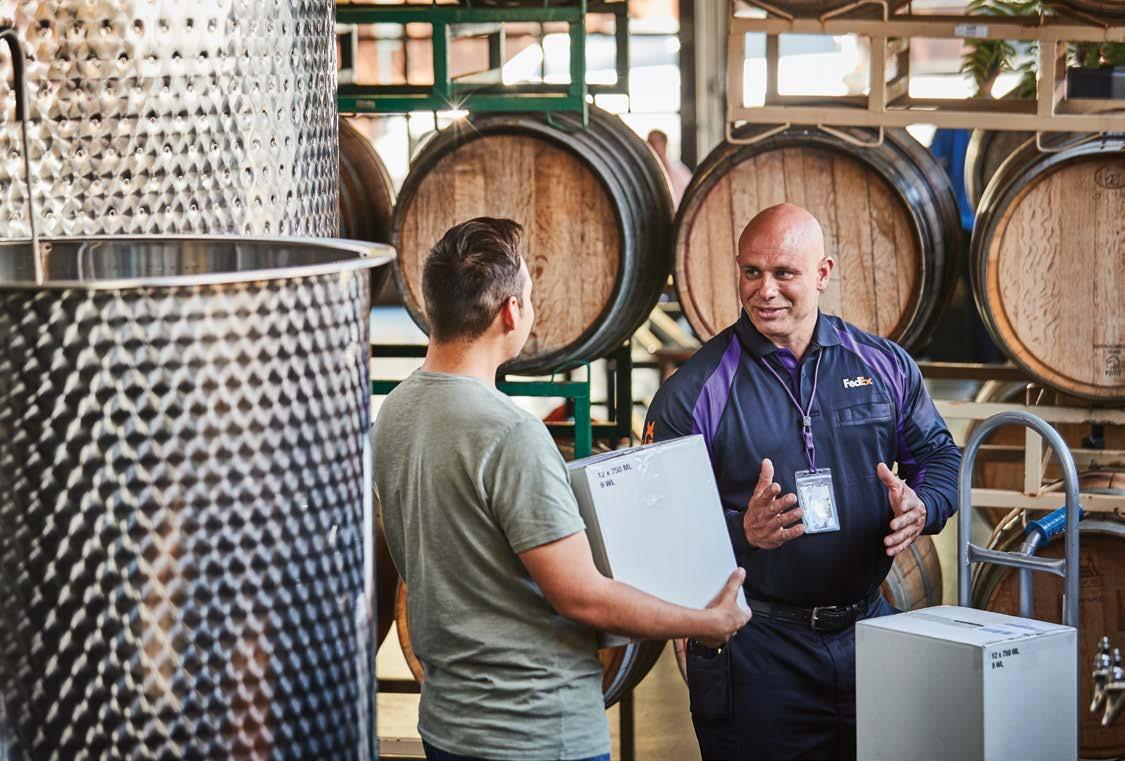
With evolving consumer preferences, South African winemakers realised the need to tailor their strategies and refine their craft, producing wines that resonate with diverse audiences. Every wine reflects the personality of the winemaker and the consumer. Naturally, winemakers want their wines to receive the same level of attention when they are shipped to the customer.
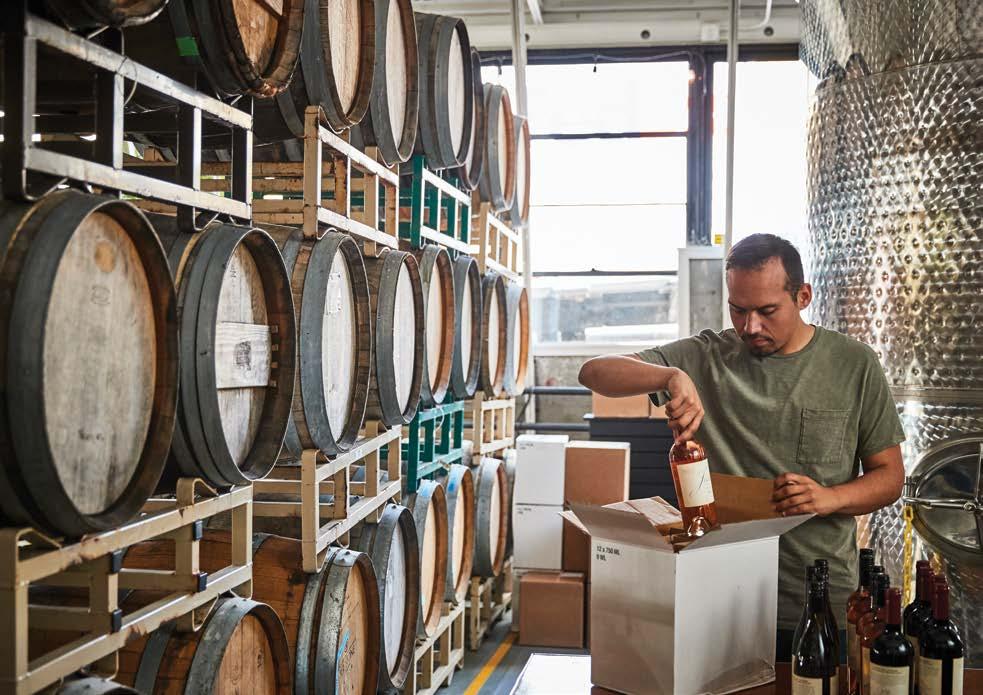
When it comes to logistics, innovation is key. Here, FedEx leads the charge, harnessing cutting-edge technologies to streamline processes and enhance efficiency. Realtime tracking, route optimisation, and advanced cooling solutions are just a few examples of FedEx’s commitment to driving progress within the wine industry. Customers are offered free customised packaging designed specifically for shipping wine internationally. To also meet the sustainable requirements of the customers, shipping options are offered in standard and eco-friendly packaging to help ship the vintage safely and securely.
FedEx has been a trusted partner in the South African wine industry. As the world’s largest express transportation company, FedEx offers a wide range of shipping services to more than 220 countries – one can count on FedEx to
offer time-definite service, reliability, and expertise. With a dedicated team of wine industry specialists, a wine shipping guide, and tailored shipping solutions, FedEx has been successfully enabling winemakers with a specialised solution to expand their reach and deliver wines with confidence.
As we raise our glasses to honour the South African wine industry, let us also raise a toast to FedEx’s enduring partnership with the wine industry. As the industry continues to evolve, such partnerships will remain a crucial ingredient for global success.


Throughout my career I’ve had the privilege and opportunity to work with businesses across the world. Often this has meant operating in places facing economic fluctuations, geopolitical shifts, and local tensions that posed significant personal and professional challenges. While trying, these challenges have provided opportunities for me to grow my business leadership acumen by employing unique strategies and approaches, writes Adrian Moors, Gutsch Family Trust Director.
The ability to navigate complex markets is essential to ensuring long-term success for any business operating across different markets. Sohow can leaders effectively steer their businesses through uncertain waters?
Here are a few things I’ve learned through my own experiences…
To make yourself welcome, humility is key.
One of the most significant challenges businesses face when operating in diverse and sometimes unstable regions is understanding the local market. Often, business leaders from the West default to the lessons learned at business school, applying Western models without appreciating the local context.
What many fail to realise is that success in a new region requires an open-minded approach. Understanding the intricacies of the local market, its culture, and its people is crucial. Approaching the local landscape with humility, rather than arrogance, will make all the difference in establishing a successful and sustainable operation. And it’s not just about “understanding” the market – it’s about integrating and respecting its dynamics.
Embrace diversity by leveraging local expertise.
A key lesson for leaders is the importance of diversity – not only in the broader workforce, but also within leadership teams. It is easy to make the mistake of bringing in so-called “experts” from outside, who may have valuable knowledge but lack an understanding of local nuances. Experts from a Western or European context may struggle to navigate the local market successfully.
Instead, investing in local talent and diversity within your team can provide invaluable insights and perspectives that will help shape your strategy. Tapping into local expertise ensures that your approach is grounded in real-world experience and is better aligned with the market. Through this process the “foreign” experts may also enhance their own skills. Knowledge sharing is mutually beneficial, and best practices are often found in the most surprising places.
go a long way in building trust and rapport with local employees and customers.
When I worked in China, I made a concerted effort to learn Mandarin. While I never mastered it to the point of delivering presentations, my attempts to communicate in the local language were appreciated by the staff and customers. Even if I didn’t understand every response, my effort to break the language barrier made me more relatable and helped foster positive relationships. Doing so also showed respect and a willingness to engage, which is crucial in establishing meaningful connections.
A strategy is only as strong as your ability to implement it.
When it comes to balancing a global business strategy with the local workforce required, the key is execution. A strategy is only as strong as its execution. The most brilliant strategy will fail if the most basic team member – be it a sales representative in a rural area or a customer service staff member – doesn’t have the tools or the understanding to implement it effectively.
“… investing in local talent and diversity within your team can provide invaluable insights and perspectives that will help shape your strategy.”
Trying to learn the local language counts
Effective communication is one of the most powerful tools a leader can wield, especially when navigating a foreign market. While learning a new language may seem daunting, even a basic understanding can
Leaders need to ensure that their teams have the proper resources, whether that’s elements such as uniforms, transport, or simply clear and articulate instructions. Once the foundational elements are in place, the strategy can be prioritised and executed with precision. It’s a mistake to assume that a “one-size-fits-all” approach will work across diverse markets. Prioritisation becomes crucial in ensuring that teams remain focused on what truly matters. It is also far easier to motivate teams around succinct ideas and goals, rather than a multipage strategy document.

Understand your appetite for risk and mitigate effectively
Risk management is at the heart of navigating any market. Every business faces its own set of risks, and these risks evolve based on both internal and external factors. Whether you’re managing risks related to finance, reputation, production, or geopolitical instability, the first step is identifying and understanding these risks clearly.
In some of the companies I’ve been involved with, we’ve developed detailed risk registers to track and assess potential risks. Regularly reviewing these risks allows leaders to respond proactively. The key is to identify your business’s risk appetite and then mitigate the impact of the most significant threats. For global brands, the consequences of mistakes in one market can ripple across the globe, so risk management is non-negotiable.
Patience is a (business) virtue
When entering a new market, it’s tempting to quickly form close relationships with the first people you meet. But it’s important to exercise caution, as the first person you connect with may not always be the right partner for your business (or socially). Similarly, getting too involved with specific political parties, government officials or even social causes can expose a business to unnecessary risks.
The key is patience. Understanding the local environment, including the political and social landscape, before making any major decisions is crucial. Once
Economic and geopolitical instability can throw even the most well-thought-out strategies into turmoil. A few years ago, while operating in Mozambique, I witnessed the dramatic collapse of the local currency. In times like these, it’s important to remain flexible while making tough choices.
Focusing on profitable markets, cutting losses in struggling ones, and being transparent about the changes you’re making can help a company weather such storms. In these moments, leaders must be ready to adapt quickly and be transparent with their teams. This goes beyond tweaking a strategy — it’s about ensuring the company’s survival.
you have a clear picture of the lay of the land, you can navigate more effectively and avoid the common pitfall of overcommitting to political allegiances or business partners who may not serve your long-term interests.
Today’s crises are tomorrow’s opportunities
Geopolitical instability is impacting many of the world’s largest economies. From dramatic changes in US and UK policies to shifting dynamics in Europe, leaders must be cautious in making large-scale decisions. However, this uncertainty also presents opportunities, especially in emerging markets.
In South Africa, for example, despite our many challenges, there is a growing sense of optimism and resilience. The country’s ability to navigate political instability and emerge stronger offers valuable lessons for businesses looking to invest in the region. The relative stability of South Africa’s political environment, coupled with a dynamic and optimistic population, presents an ideal environment for growth and opportunity.
As leaders, we must remain cautious, yet forwardthinking. In complex markets, our ability to adjust quickly, listen actively, and act with empathy and understanding can be the defining factor in whether we succeed or fail. The road to success in these volatile times is not a straight one, but those who are agile, respectful, and clear in their vision will emerge stronger and more resilient on the other side.








Simthembile Mapu, Executive Manager for Business Development and Support at Richards Bay Industrial Development Zone (RBIDZ), talks about securing R247 billion in investments, expanding South Africa’s energy mix, and driving industrial growth. He shares insights on key projects, future opportunities, and why RBIDZ is a prime destination for investors looking to be part of Africa’s next growth phase.
Can you share a brief overview of your background and journey to your current role at RBIDZ?
With over 18 years of experience in strategic investments and infrastructure development, my journey to Executive Manager of Business Development and Support at RBIDZ has been shaped by impactful projects across South Africa.
I started in 2007, co-ordinating property valuations for Nelson Mandela Bay Metro, building expertise in investment and project management. Moving to the private sector, I led developments, including a R500 million public transport facility and national retail projects at Mandulo Property Partners.
As chief investment officer at EMRE Fund Managers, I focused on unlocking economic potential in townships and secondary towns. This led me to RBIDZ in 2020, where I now drive initiatives positioning the zone as an industrial hub. My team has secured over R247 billion in investments, including a R1.8 billion edible oils refinery and a R15 billion titanium dioxide plant.
I am currently pursuing a Master's in Development Finance and am committed to aligning RBIDZ’s goals with sustainable economic growth.



As executive manager for Business Development and Support, what are your core responsibilities?
My role focuses on driving investment growth, fostering strategic partnerships, and executing projects that align with RBIDZ’s mandate and South Africa’s industrial goals. I lead the investment promotion strategy, identify sectoral opportunities, and present proposals, while overseeing end-to-end investor support through RBIDZ’s one-stop shop service, which streamlines approvals, incentives, and infrastructure access. Additionally, I collaborate with government, private sector, and international partners to position RBIDZ as Africa’s premier industrial hub, leading sector-specific missions and securing largescale investments.
What excites you most about leading investment promotion at RBIDZ?
Catalysing high-impact projects, such as the R15 billion titanium dioxide plant and 3 000MW gas-to-power initiative, allows us to shift South Africa from raw mineral exports to value-added manufacturing. These investments create thousands of jobs, enhance energy security, and reduce import dependency, positioning RBIDZ as a cornerstone of economic resilience.
Equally thrilling is unlocking Africa’s industrial potential through strategic partnerships.
Collaborations like the Zululand Energy Terminal with Transnet aim to transform Richards Bay into a global energy hub. Every project isn’t just a milestone, it’s a step toward a more equitable, sustainable, and prosperous continent, where industry uplifts people and reshapes possibilities.
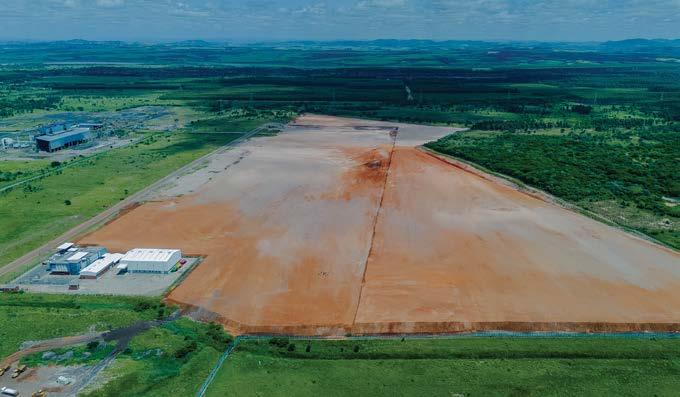
Which industries or sectors are you prioritising for future investment growth?
We prioritise sectors that align South Africa’s industrial ambitions with global sustainability trends.
Energy and renewables lead, with the Zululand Energy Terminal (ZET), an LNG partnership with Transnet and Vopak, supporting Eskom’s 3 000MW gas-to-power project and an 800MW offshore wind initiative, positioning Richards Bay as a clean energy hub.
Mineral beneficiation transforms raw materials into highvalue products. The titanium dioxide plant boosts the paints and coatings sector, and plans to revive ferrochrome smelting drive energy-efficient, job-rich processing.
Agro-processing strengthens advanced manufacturing. The edible oils refinery reduces import reliance, and the Agri Hub connects small-scale farmers to value chains.
With logistics upgrades at the Port of Richards Bay and AfCFTA opportunities, RBIDZ aims to create 15 000 jobs by 2030, empower communities, and drive sustainable growth.
What major investments or partnerships have been secured under your leadership?
Under my leadership, RBIDZ has secured R247 billion in transformative investments, cementing its role in South Africa’s industrial and energy transition.
Since 2020, we’ve expanded RBIDZ’s energy portfolio from 3 400MW to 7 357MW, driven by gas-to-power projects (3 957MW) and an 800MW offshore wind initiative aligned with the Integrated Resource Plan (IRP).
How do you see RBIDZ evolving over the next five years?
Over the next five years, RBIDZ will become a hub for sustainable industrialisation and inclusive growth, focusing on energy, mineral value addition, and community-centric
development. By 2029, RBIDZ will operationalise the 3 000 MW gas-to-power project and advance the Zululand Energy Terminal (ZET) with Transnet and Vopak. The titanium dioxide plant will drive downstream industries, while reviving ferrochrome processing strengthens SA’s position in high-value exports under AfCFTA. The fresh produce agri-hub, in partnership with KZN Agriculture, will connect small-scale farmers to agroprocessing, and the Nal’ithemba enterprise programme and RBIDZ Skills Academy will create 10 000 jobs by 2029, prioritising youth and women.
What advice would you give to potential investors considering RBIDZ?
Investors considering the RBIDZ should strategically leverage its unique advantages to maximise success. They should prioritise projects aligned with RBIDZ’s core initiatives, which offer significant opportunities for innovation and market leadership. To facilitate efficient project implementation and cost optimisation, they should embrace SEZ-specific benefits, including streamlined administrative approvals and attractive tax incentives.
Additionally, embedding community development and social impact into investment strategies is essential. Initiatives that enhance local livelihoods, skills development, and responsible business practices strengthen long-term business sustainability and acceptance. Leveraging regional frameworks like the AfCFTA can expand market reach, especially for exportdriven industries like renewables, energy, or titanium dioxide processing.
www.rbidz.co.za | info@rbidz.co.za | invest@rbidz.co.za

SANDRA
Kneubuhler will now lead the Group’s operations in English-speaking African countries, leveraging her extensive operational experience to drive continued growth and progress across the continent. Rochell Schonken will step into the role of Country Director of Sales for South Africa, one of the positions previously held by Kneubuhler.
2024 saw the Group broadening its African footprint with the addition of seven properties in key markets, bringing its portfolio to almost 100 hotels on the continent and putting it on track to reach its goal of 150 hotels within the next five years. The Group also surpassed market and industry benchmarks across critical performance indicators, including market share, guest satisfaction, and profitability.
Optimistic about the future, Kneubuhler points out that the Group’s extensive presence in the region means that it is well-positioned to capitalise on growth opportunities, particularly in Nigeria, Tanzania, and South Africa.
She emphasises that Schonken will play a vital role in driving the Group’s regional expansion, unlocking South Africa’s growth potential by leading the sales team to not only meet, but exceed targets, especially in the B2B arena. “Since joining Radisson in 2015, Rochell has consistently delivered impactful results that have directly contributed to the Group’s continued success,” she says.

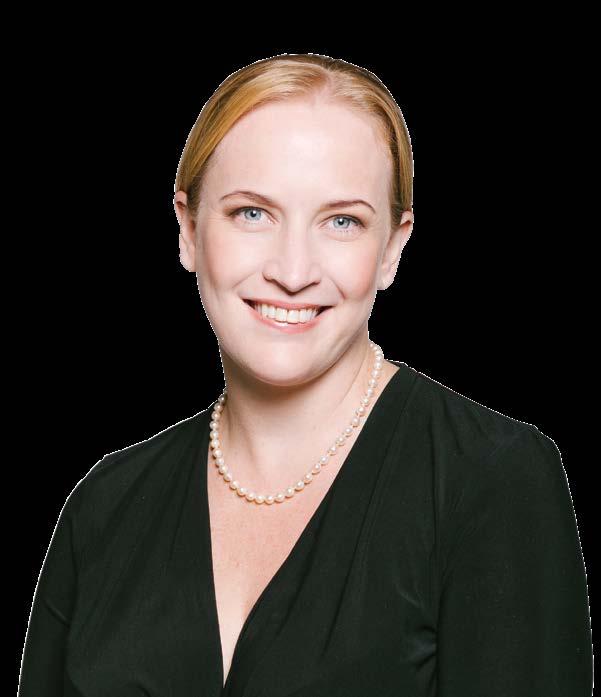
Kneubuhler is excited about the potential of the SubSaharan African region, its people, and the transformative role hospitality can play in enhancing the lives of communities and individuals alike. Her immediate priorities include connecting with regional teams, fostering career development, and building a skilled workforce to support the Group’s expansion plans. “This is a personal passion of mine, and while the Group has always done this well, it is an area where I want us to raise the benchmark and become recognised as industry leaders.”
Since joining Radisson in 2015, Rochell has consistently delivered impactful results…”
By the end of 2025, she aims to boost the region’s profitability through strong top-line growth while also nurturing more female leaders. One of her initial steps will be to host the inaugural Radisson Academy Live in Nigeria, providing vital training and development for teams in the country.
“I look forward to leading our talented teams across Africa as we work together to meet our expansion goals and continue to raise the standard of excellence across the hospitality industry,” says Kneubuhler.
Industries that benefit from our proven solutions:
Mining Construction Sites
Railways
Quarries
Agriculture
Communities
Transport Yards
Civil Construction
Dry Bulk Material terminals
Municipal and Rural Road Networks
Tailings Facilities and Waste Dump
At Dust-A-Side, health, safety, environment, and quality (SHEQ) are at the heart of everything we do. This commitment is critical to our mining clients and is one of our core values, ensuring that every project not only meets but exceeds industry standards.
The in-house R&D team at Dust-A-Side develops trialled and tested solutions that significantly benefit the mining and quarrying industry, agriculture, local communities as well as other sectors requiring dust control by improving environmental quality, enhancing health and safety, and promoting sustainable practices.
We don't believe in one-size-fits-all. Every solution is tailored based on site-specific needs, using data from rigorous lab testing and site assessments. Our SANAS-accredited testing ensures the most reliable and effective outcomes for your operation.




Workplace relationships form the backbone of any successful business. Shop stewards, who are employees elected by their fellow trade union members to represent their interests, play a crucial role in maintaining fair labour practices.
By Ezekiel Dikio, Junior Associate at Moodley’s Attorneys Inc.
However, when conflicts arise, particularly those involving shop stewards, mismanagement can lead to legal disputes, strained relations and financial losses. A solid understanding of labour law, coupled with proactive relationship management, can help employers navigate these challenges and foster a harmonious workplace.
As a labour lawyer, I have had the privilege of working with various businesses to navigate the complexities of South African labour law.
One recent case involved a shop steward who was dismissed for gross misconduct. This case provides valuable insights into balancing shop steward rights
with employer responsibilities while ensuring compliance with legal principles.
The case revolved around a shop steward who had verbally abused and assaulted a colleague. Given the workplace’s strict zero-tolerance policy for such behaviour, the employer had no choice but to proceed with disciplinary action, which ultimately resulted in the shop steward’s dismissal. While the employer’s policies were clear and compliant with labour law, the incident underscored a broader issue: the delicate balance between the shop steward’s rights and responsibilities, and the employer’s obligations.
A shop steward remains an employee first, and is subject to the same rules and regulations as any other employee. Holding the position does not entitle a shop steward to special treatment or exemption from workplace policies. As such, shop stewards are expected to serve their employers honestly and faithfully.


In the landmark case of Modise & Others v Steve’s Spar Blackheath (2000) 21 ILJ 519 (LAC), the Labour Appeal Court held that even where an employer has strong grounds for dismissal, procedural fairness must always be observed. This ruling reinforces the principle that even in cases of severe misconduct, employers must follow due process to avoid unfair dismissal claims.

Shop stewards are vital intermediaries in a unionised workplace. They serve as a bridge between employees and management, ensuring compliance with labour regulations while advocating for workers' rights. Their roles are enshrined in Section 14 of the Labour Relations Act 66 of 1995 (the “LRA”), making it essential for business owners/employers to understand the scope of a Shop Steward’s duties.
Section 14 of the LRA grants shop stewards several key rights, including:
• Assisting employees in disciplinary and grievance hearings.
• Monitoring and reporting employer contraventions of the law.
• Taking reasonable time off with pay to perform these duties.
While these rights are critical for fair labour practices, they must be exercised within the bounds of professionalism and workplace policies to prevent conflicts and abuses of power.
In another case, this time, Mondi Paper Co Ltd v PPWAWU & Another (1994) 15 ILJ 778 (LAC), the Court held that shop stewards play an important role but that the position is not a license for unruly behaviour. In this particular case, the shop steward was dismissed for deliberately disrupting a meeting with management. The Court also held that a shop steward should fearlessly pursue the interests of the members he represents, and that he ought to be protected against being victimised for doing so.
The Court furthermore held that the position of Shop Steward is not a license to resort to defiance and needless confrontation, and that a shop steward remains an employee, from whom his employer is entitled to expect conduct that is appropriate to that relationship.
This case provides several important takeaways for business owners:
• Clear policies and communication... Ensure that workplace policies are comprehensive and well-communicated. Employees and stewards alike should understand the boundaries of acceptable behaviour. Regular training sessions can reinforce these expectations and reduce workplace conflicts.
• Documentation is key.
Maintain detailed records of all incidents, grievances, and actions taken. Thorough documentation strengthens disciplinary processes and provides essential evidence in the event of legal disputes.
• Engage shop stewards constructively. Include shop stewards in discussions about policy implementation. Their involvement can foster better communication between management and employees, reducing the likelihood of grievances. The case of South African Airways (Pty) Ltd v Bogopa & Others (2007) 28 ILJ 2718 (LC) demonstrated how constructive engagement between management and employee representatives can mitigate workplace disputes.
"Shop stewards are vital intermediaries in a unionised workplace."
The relationship between shop stewards and minimise disputes and foster a positive work environment.
The relationship between shop stewards and business owners is integral to workplace harmony. By understanding the responsibilities of both parties and maintaining open lines of communication, businesses can minimise disputes and foster a positive work environment.
investing in strong workplace relationships not only
As I often advise my clients: “Engage, educate, and document.” These three principles form the foundation of a compliant and collaborative workplace. Ultimately, investing in strong workplace relationships not only reduces legal risks, but also promotes a more productive and engaged workforce.

Claudette Smith’s career path to becoming a franchise owner is an inspiring tale of passion, persistence, and preparation. After years of working for others, she decided to pursue a lifelong dream: running her own coffee shop. She now owns a Shift Espresso Bar franchise in Observatory, Cape Town. Here she gives us a peek into her journey, the mindset shifts she was forced to make, and the lessons learned along the way.
CLAUDETTE SMITH | SHIFT ESPRESSO BAR FRANCHISE OWNER
Before opening your Shift Espresso Bar franchise, what was your career path like?
Before diving into franchising, I spent several years as a general manager at Col’Cacchio Pizzeria while simultaneously working as a sales agent at Pam Golding Properties for eight years. After leaving the hospitality industry, I transitioned fully into real estate. My careers in both industries gave me the experience and skills to make my dream of owning a coffee shop a reality. It had always been a passion of mine, and it felt like the right time to make it happen.
Was entrepreneurship always on your radar, or did it find you along the way?
Entrepreneurship has always been in my sights. Although my journeys in real estate and hospitality helped me build a solid foundation, the goal of being my own boss and running a café had always been part of the plan.
How did you prepare for the transition into franchising, and what advice would you give to others considering it?
I took the time to learn about the operational side of the business, the support structures in place, and the financials that come with it. I also reached out to other franchisees for guidance. My advice to anyone considering franchising is simple: do your homework, fully understand the franchise model, and ensure your values align with the brand. It’s a lot of hard work, but the rewards are well worth it.
What was it about Shift Espresso Bar that made you say, ‘This is the business I want to invest in!’?
I’ve had a close relationship with the franchise since its second store opened, and I’d watched the brand grow over the years. I’ve always wanted to be part of that journey. Yes, there will be challenges, especially since it’s a newer brand, but I’m excited to contribute to its growth and tackle those challenges head-on. I see a lot of potential and am eager to help bring it to the next level.
Did you have any mentors or business influencers who helped guide your decision?
I’ve been incredibly fortunate to have had some wonderful mentors throughout my career, particularly in hospitality and real estate. Their insights have been invaluable. They’ve helped me navigate the challenges of business ownership and guided me in making the right decisions. I’ve made a point of keeping them involved in my journey, learning from their experiences and applying those lessons even as I manage my franchise today.
What are some of the mindset shifts you had to make in order to step into business ownership?
It required a significant shift in mindset on various fronts, namely...
Employee to entrepreneur:
I had to take full responsibility and make decisions independently.
Risk to opportunity:
I learned to view risks as opportunities for growth, rather than obstacles.
Long-term focus:
My focus shifted towards sustainability and planning for the future.
Self-discipline:
With no boss to defer to, I had to hold myself accountable and stay disciplined.
Delegation:
I had to trust my team and empower them to help drive the business forward.
Growth zone:
Growth zone:
I embraced discomfort as part of the process of growing, both personally and professionally.
Every entrepreneur has a "trial by fire" moment; what was yours?
My “trial by fire” came early on when I had to manage a team of 50 staff members as the GM at Col’Cacchio. At the time, I was also venturing into real estate, and my first pitch for a sole mandate had me feeling nervous and unsure. But pushing through those moments of doubt taught me more than just the technical side of business. It taught me trust, persistence, and the power of believing in myself. That experience was crucial in shaping who I am today, both as a business owner and as an individual.
Professor Francis Petersen, recently appointed as ViceChancellor and Principal at the University of Pretoria, has the unique edge over many other scholars due to his vast experience in both academia and industry. The former University of the Free State (UFS) Vice-Chancellor holds a PhD in Engineering and has occupied leadership positions in Anglo American Platinum and the CSIR. As Universities South Africa (USAf) Chairperson, he shares his vision for UP and higher education in this exclusive interview.
PROFESSOR FRANCIS PETERSEN | VICE-CHANCELLOR AND PRINCIPAL AT THE UNIVERSITY OF PRETORIA
Your career spans both academia and industry. How has this unique combination of experiences shaped your leadership approach at UP? My experience has certainly helped me recognise that developing knowledge –particularly new knowledge – is not just for its own sake, but ultimately to improve society. If I consider my time in academia, my focus was very much on generating new knowledge, imparting that knowledge to students, and guiding them to graduation so they could contribute meaningfully to the economy.
In contrast, industry operates with a different focus – it looks at the products that need to be created, how to produce them effectively and efficiently, and how that process can add value not just to the company but also to its employees and the broader society.


For me, these two aspects complement each other: on the one hand, education and the development of new knowledge, and on the other, the application of that knowledge to create products that can enhance people's lives. Having experience in both fields has helped me refine my understanding of what knowledge needs to be imparted, what type of research should be conducted, and how best to transfer research findings to industry and the private sector. Ultimately, it has shaped my passion for ensuring that what we do at university has a tangible impact on society.
Having experience in both fields has helped me refine my understanding of what knowledge needs to be imparted, what type of research should be conducted, and how best to transfer research findings to industry and the private sector.”
Could you expand on your industry experience and how it has influenced your perspective?
I have spent 18 years in academia and 12 years in industry, giving me a well-rounded perspective on both. My career, of course, began in academia before transitioning to industry, where I worked on technology transfer in the mining sector, engaging with stakeholders across the private sector and government.
At Anglo American I operated at an executive level, overseeing technical operations for Anglo American Platinum. The company’s head office is in London, where I spent a considerable amount of time. My role involved around 70 underground visits, working closely with engineers, scientists, and production teams to optimise efficiencies. I was also involved in the transportation and value-adding of metals within Africa, and engaged with clients in Europe, China, Japan, and the US. This exposure provided insights into corporate strategy, government relations, and high-level decision-making.
I represented Anglo American Platinum at Business Leadership South Africa and advised multiple ministers of science, technology, and innovation, gaining first-hand experience in shaping policy and translating data into strategic decisions.
What, in your opinion, makes a good leader?
Leadership starts with listening and understanding context. A strong leader inspires people to buy into a shared vision, whether through servant leadership, leading by example, or empowering others. Ultimately, leadership is about the organisation, and the organisation is its people. True leadership ensures people feel valued and motivated to contribute to a common goal.
As financial pressures mount, which alternative funding models should South African universities consider to ensure sustainability?
Universities should continue engaging with the government, despite reduced funding. We need to be innovative in how we collaborate, leveraging our collective expertise to develop sustainable models. Government funding remains crucial, and universities should co-create solutions that reinforce its importance.
Strengthening partnerships with the private sector is also vital, especially in key economic corridors like the PretoriaJohannesburg region, which drives 65% of South Africa’s economy. Collaborations with industry and commerce can improve financial stability. Additionally, philanthropic funding plays a crucial role – engaging alumni, local, and international foundations to support strategic initiatives that may not otherwise secure funding.
What is your vision for UP, and how does your five-point strategy support this vision?
UP aspires to be a research-intensive university in Africa, recognised globally for quality, relevance, and impact. Our focus is on developing people, generating new knowledge, and making a tangible difference locally and globally. To achieve this, we have a five-point strategy:
1. People-centric culture: Creating an environment where everyone feels valued – and belongs.
2. Global stature and impact: Strengthening our research excellence to enhance UP’s international standing.
3. Strategic location advantage: Leveraging Pretoria’s status as Africa’s diplomatic capital to position UP as a global thought leader on African issues.
4. Digitalisation roadmap: Using technology to enhance teaching, learning, research, and infrastructure management – such as digital twinning for optimising campus spaces.
5. Community engagement and societal impact: Demonstrating the real-world benefits of our research and education to build public trust in higher education.

Cutting-edge IT trends are revolutionising the business landscape in 2025, fuelled by rapid technological advancements across all sectors. At the heart of this transformation is AI, alongside a suite of emerging trends that are becoming indispensable to any forward-thinking IT strategy.
Warren Bonheim, MD of Zinia, a leading IT technology group and Managed Services Provider, identifies six key trends for 2025, emphasising their transformative potential across industries.
Agentic AI has recently become a notable trend in artificial intelligence, signifying a shift towards systems capable of autonomous decision-making. This type of AI merges the conversational prowess of large language models (LLMs) such as ChatGPT with the accuracy of traditional programming. Such systems can autonomously perform complex tasks, continuously learning and adapting from user interactions and external data. Agentic AI represents a significant evolution, enhancing operational efficiency and enabling more sophisticated, dynamic technology interactions within businesses.
As AI integrates more deeply into business operations, the necessity for robust ethical guidelines and stringent regulations is becoming more apparent, especially as AI technologies pervade critical sectors like finance and healthcare. These frameworks, which are rapidly evolving, not only govern how AI is developed and deployed, but also ensure transparency, security, bias mitigation, and accountability. Businesses must proactively adapt to these frameworks to establish trust and maintain a competitive edge, as neglecting these aspects can lead to significant reputational and legal consequences.

3
The rise of CSMA addresses the increasing complexity and frequency of cyber threats. CSMA offers a modular, flexible security infrastructure that allows various security services to integrate seamlessly, enhancing defences at every digital touchpoint. This approach is crucial for businesses embracing remote operations and cloud-based resources, providing robust protection against diverse cyber threats.
Disinformation Security has emerged as a critical need in the digital age, where false information can quickly spread, damaging reputations and misleading stakeholders. Businesses are increasingly deploying advanced AI tools to monitor and counteract misinformation, and training employees to tackle these challenges effectively. These strategies are essential for preserving integrity and public trust in an era of information overload.
5
Sustainable IT practices are becoming more critical as environmental concerns grow. Businesses are adopting green IT strategies, such as using energy-efficient hardware and optimising data centre designs, to reduce their carbon footprint and operational costs. These practices not only fulfil ethical responsibilities but also attract eco-conscious consumers and partners.
6
Digital Twins technology is revolutionising industries by creating virtual replicas of physical systems or processes. These tools allow companies to simulate and analyse scenarios without the risks of real-world implementation, enhancing decisionmaking and efficiency in sectors like manufacturing, urban planning, and healthcare.
The 2025 IT landscape is being shaped by a blend of fast-evolving technological innovations and strategic imperatives. Businesses embracing these trends will not only enhance their operational efficiency, but will also be able to navigate the complexities of a digital and interconnected future more effectively.

The focus on Environmental, Social, and Governance (ESG) factors has become a critical element in strategic decision-making. Chief Information Officers (CIOs) are increasingly aligning their businesses with sustainability, from reducing carbon footprints to fostering social equity. However, a critical contributor to these goals often goes unnoticed - IT hardware.
By Xperien CEO Wale Arewa
Contrary to the perception that used IT equipment is merely e-waste, it holds significant potential to advance ESG objectives. By leveraging IT Asset Disposition (ITAD) as a strategic tool, businesses can unlock the environmental, social, and governance value hidden within their IT assets while demonstrating leadership in responsible business practices.
The life cycle of IT hardware, from procurement to disposal, carries considerable environmental and social implications. When managed responsibly, used IT equipment can help organisations mitigate their carbon footprint, promote circular economy principles, support social responsibility initiatives and mitigate the opportunities for data loss.
CIOs play a pivotal role in this endeavour. While they understand the operational importance of IT hardware, many overlook its potential to drive ESG outcomes. By adopting sustainable practices throughout the asset life cycle, CIOs can align IT operations with broader corporate ESG goals.
Chief Sustainability Officers (CSOs) face the daunting task of quantifying their organisation’s ESG impact, particularly regarding IT assets. Accredited IT Asset Management (ITAM) service providers offer crucial support by gathering Scope 3 carbon sequestration data, tracking social impacts, and ensuring compliance with ESG reporting standards.
ITAD is no longer just about compliance – it’s about creating tangible value. With the ITAD market expected to exceed USD 51 billion by 2030, its role in shaping governance, risk management, and sustainability is undeniable.
Collaborating for sustainable impact
To effectively integrate ITAD into ESG strategies, organisations must adopt a multifaceted approach. Collaboration across departments, from legal and finance to marketing and operations, is essential.
Chief Marketing Officers (CMOs) are particularly wellpositioned to showcase sustainability achievements. By leveraging verified impact data related to IT hardware, CMOs can craft compelling narratives that highlight the company’s commitment to transparency and accountability. These stories resonate with environmentally conscious consumers and differentiate the brand in a competitive market.
Going beyond compliance and demonstrating a proactive stance on ESG builds trust with stakeholders. It’s about fostering a culture where sustainability isn’t just a goal but a fundamental part of the business ethos.
By leveraging IT Asset Disposition (ITAD) as a strategic tool, businesses can unlock the environmental, social, and governance value hidden within their IT assets…”

Used IT hardware provides a unique opportunity to advance ESG objectives. Partnering with service providers that specialise in ITAM enables organisations to track the life-cycle impacts of their IT assets, including carbon savings and social contributions.
For example, donating refurbished computer equipment to educational or community initiatives not only extends the life of IT assets but also reinforces social equity. Additionally, by ensuring responsible disposal processes, companies can prevent e-waste pollution, recover base materials and demonstrate environmental stewardship.
The growing emphasis on ESG is also reflected in investor behaviour. In 2020, 85% of investors considered ESG factors in their decisions, according to a PwC survey. Furthermore, 76% of clients indicated they would sever ties with companies demonstrating poor treatment of the environment, employees, or communities.

Organisations must recognise ITAD as a strategic enabler, not merely a compliance requirement. By embedding ITAD into their ESG frameworks, companies can achieve:
Reduced carbon footprints through equipment reuse before recycling
Enhanced corporate reputation by showcasing measurable sustainability efforts
Increased stakeholder trust through transparency and accountability
Amid today’s escalating business challenges, ITAD stands out as a symbol of responsible corporate conduct, steering enterprises towards a future defined by sustainability, adaptability, and collective prosperity.
To avoid the pitfalls of greenwashing and ensure genuine impact, organisations must prioritise data accuracy and transparency in their ESG reporting. Partnering with accredited service providers not only streamlines this process but also strengthens the credibility of their sustainability claims.
The time is now for CIOs, CSOs, and CMOs to harness the untapped potential of IT hardware. By integrating ITAD into a comprehensive ESG strategy, businesses can lead by example, fostering environmental stewardship and building a foundation of trust and loyalty among clients, employees, and investors alike.
ITAD is not just a process - it’s a movement. A movement that transforms used IT hardware from an operational necessity into a powerful force for positive environmental and social change.







Africa’s payments landscape is undergoing significant transformations driven by technological advancements, shifting consumer behaviours, and innovative business models. These changes are reshaping financial transactions across the continent.
By Katlego Maphai, CEO & co-founder of Yoco technologies
Digital payments are experiencing unprecedented global growth. According to Worldpay’s 2024 Global Payments Report, real-time payment transactions reached 266.2 billion in 2023, marking a year-on-year growth of 42.2% and representing 19.1% of all electronic transactions globally. This surge underscores the increasing reliance on efficient, real-time solutions that are quickly becoming mainstream.
ACI Worldwide’s 2024 report projects that real-time transactions will rise to 575.1 billion globally by 2028, demonstrating a compound annual growth rate of 16.7% from 2023. This growth highlights a shift towards realtime payments accounting for 27.1% of all electronic transactions, emphasising the demand for instant processing.
Yoco’s innovations in payment solutions
Yoco is at the forefront of integrating payment solutions with business management tools, helping businesses of all sizes enhance operational efficiency and customer engagement. Recent innovations include:
• The Yoco App: Launched in August 2024, the redesigned Yoco App allows business owners to manage operations on the go, offering refunds, sales tracking, staff management, cash advances, and reporting from a single platform. It has evolved from a card machine companion into a comprehensive business management tool.
The adoption of digital wallets is soaring, accounting for 50% of point-of-sale transactions and 70% of e-commerce spending, driven by their convenience and enhanced security features.
The expansion of digital and virtual payments, particularly virtual card payments, is projected to exceed 250% growth by 2028. This surge is fuelled by their increasing role in managing accounts receivable and payable, as highlighted in Research and Markets’ 2024 report.

• Yoco Counter: An all-in-one POS system for small businesses, combining a sleek widescreen tablet and software. It offers easy setup and integration with other Yoco devices for seamless ordering, product management, and customer-facing payments.
• TABLE by Yoco: sA revolutionary restaurant operating system designed to streamline operations with real-time insights, inventory management, and automation. Features include tableside ordering, kitchen management, and cloud-integrated payments, improving efficiency and reducing customer wait times.
Looking ahead to 2026 and beyond, several key developments are expected:
• Blockchain-based payment systems are likely to
achieve mainstream adoption.
• Major African economies are set to launch Central Bank Digital Currencies (CBDCs), redefining monetary policies and financial practices.
• Enhanced interoperability between payment systems will enable seamless transactions across the continent.
Africa’s payments landscape is on a strong growth trajectory, driven by technological innovation and supportive regulatory frameworks. As these trends unfold, the continent’s payment ecosystem is not only becoming more dynamic and inclusive, it’s also playing a pivotal role in the global financial landscape.
The focus remains on developing solutions that address local needs while meeting international standards, ensuring a robust and accessible financial future for all Africans.
A South African independent investment platform backed by a major bank, Clarity is your secure, global and digital alternative for investing and trading in the world’s financial markets.

Clarity, by Investec, is officially open to the general public, broadening the investable universe for local investors.
Combining innovation, control, and international reach, this self-managed, high-tech trading platform empowers a new generation of tech-savvy investors seeking to take control of their financial portfolios by providing seamless access to local and global markets.
“The platform gained significant traction after launching to Investec Private Banking clients, attracting a diverse age range from 20-somethings to clients in their 70s,” says Tinus Rautenbach, Business Head of Clarity. “We have since implemented enhancements, prioritising quality and service excellence, and are excited to open the platform to the South African investing community.”

”Clarity provides registered account holders access to over 750 instruments listed on local and offshore markets, where users can trade on a leveraged or non-leveraged basis.”
Clarity offers registered account holders access to over 750 instruments listed on local and offshore markets, where users can trade on a leveraged or non-leveraged basis. Trading takes place via CFD (contract for difference) instruments.
“Following the boom in online trading during the pandemic, we have seen an evolution in the trading landscape driven by changing preferences for investing and creating wealth,” explains Rautenbach. “With a more technologically-driven and diversified environment, the trading and investment landscape is becoming increasingly dynamic and inclusive.”
The ability to instantly convert South African rands (ZAR) to foreign currency (such as US dollars) via Investec has been a significant adoption driver. “The average time for clients to execute a forex trade is just 25 seconds, providing clients with the opportunity to express a view on the currency and access low-risk savings products in that currency,” he adds.
There are no minimum investment requirements and, while average account sizes align with industry standards, some portfolios exceed R1 million, underscoring the brand’s strength.
There is a growing desire among retail investors and individuals with a high net worth to manage a discretionary portion of their portfolios themselves. Clarity is designed to meet that demand for do-it-yourself (DIY) investing, featuring a simple signup process on an easy-touse website and dedicated app. Both platforms offer intuitive interfaces for users.
“Our market research identified digital optimisation as a key customer need, and clients want to feel in control, which Clarity provides,” Rautenbach states.
The platform includes a digitally led in-app service model with live chat functionality and selfservice capabilities. The depth of data available to investors and the platform's speed resonate as important value propositions among traders.
Rautenbach is confident that Clarity will appeal to a broad spectrum of individuals beyond seasoned traders, bolstered as it is by the support of the trusted Investec brand. “Offering a digitally led platform for DIY investing with no brokerage fees appeals to a larger customer base, serving as a potential gateway into the Investec ecosystem,” he adds.
Clarity continues to evolve, with new products and instruments added based on client feedback. Recent additions include stocks in high-growth sectors like tech and pharmaceuticals, as well as exposure to cryptocurrencies through the iShares Bitcoin Trust (Bitcoin ETF).
“We also introduced 24/5 forex trading last year, enabling clients to exchange rands for dollars after office hours, which was previously unavailable,” says Rautenbach.
These enhancements reflect ongoing efforts to improve the client experience. There are additional product developments in the pipeline, including a more holistic trade, invest, and save solution.
Individual investors who are not Investec clients can sign up at nowclarity.com and download the Clarity app from the Apple or Android app stores to start their trading and investment journey.




